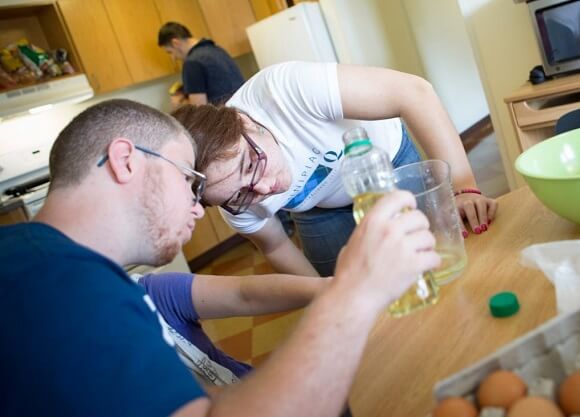
Quinnipiac-Cheshire Transition Collaborative partnership prepares students to succeed
July 09, 2018

July 09, 2018

Preparing to start its eighth year, the interprofessional program brings students, faculty and alumni from the schools of business, health sciences, medicine and nursing together with educators from Cheshire Public Schools. Together, they help high school students with autism spectrum disorder develop the social, academic and professional skills needed to excel, while building and maintaining lasting relationships.
“The success of the program is in huge part because of the belief and support from the Quinnipiac leadership team and administration,” said Kim Hartmann, professor of occupational therapy, who serves as lead faculty coordinator. “At the heart of our mission as a university, we strive to build community and be inclusive to every person. Every person with whatever level of ability can contribute to society and their community.”
Transition students complete one of three curriculums depending on their particular needs and goals.
“Bridge to Life” focuses on independent living, career exploration and internships, while “College Life” covers college-level academics, managing a class schedule and balancing study and recreational time. “Dorm Life” enables students to live independently in the residence halls on the York Hill Campus, where they must manage laundry, dining, transportation and other necessities.
“Few states even have transition programs or aid like this,” Hartmann said. “What makes ours so unique is how students and faculty not only develop the curriculums, but actively participate with the transitioning students.”
Occupational therapy student Gabby Frankel ’19 was involved in both the College Life and Bridge to Life programs. She led students on multiple practical exercises last year, including a simulated trip to New Haven, where they learned how to navigate public transportation, as well as dine out and evenly split the bill.
“I share in the feeling of success when students reach a big milestone,” Frankel said.
The program provided a practical application for what Frankel had been learning in class — particularly how to work with people with disabilities and impairments.
“This experience really opened my eyes to the growth and opportunity in the occupational therapy field,” Frankel said.
Part-time occupational therapy professor Karen Majeski is a prime example of these opportunities. An occupational therapist employed by Cheshire Public Schools, Majeski has been involved with the Quinnipiac Cheshire-Transition Collaborative since its inception, and has assisted numerous students with their transition into both college and employment.
The details of that process are what Majeski finds most rewarding.
“It’s in the little things, like helping them break down a problem or navigate various barriers,” she said.
Majeski remains in contact with many of her students, and has even received stellar reviews from several of their employers.
“Celebrating their successes never gets old for me,” she said.
The privilege of sharing in these kinds of successes isn’t limited to just Quinnipiac students and academic faculty. For the past five years, transition students have accompanied Quinnipiac Public Safety Sgt. Dominick Riley on his daily patrols of the North Haven Campus.
“It has been amazing to see their development and the progress that they make during their time here,” said Riley, who has been recognized by the program for his contribution.
On the surface, experiences like these teach transition students job skills and how to contribute as a member of a team. On a deeper level, they instill a new found sense of confidence and pride where previously there was only embarrassment and shame surrounding their disability.
Raul Erazo, the father of a Bridge to Life student, saw the change in his son immediately.
Erazo’s son worked with the Quinnipiac facilities team while also working at an area Big Y supermarket. Both experiences taught him how to self-advocate and reach out for help when he needed it, as well as better manage the kinds of everyday situations he struggled with in the past – including bullying.
“For a long time, he was very frustrated by his limitations,” Erazo said. “Now he is thriving, making friends and discovering new abilities.”
And that’s the point.
The benefits to the Cheshire students are profound. They learn to accept their disabilities and to use the tools and skills to work through various situations to not impede them from being successful and reach their full potential – whether through their academics, jobs, or building and maintaining their relationships.
Many of these students have the academic aptitude, but not the social and organizational skills. For most of us, making a cup of coffee comes naturally, but without adequate support and training, persons on the autism spectrum would struggle to master such a simple skill. They leave this program knowing that they are in charge of their own success. They learn how to be self-advocates and how to speak up or reach out for assistance.
The Cheshire Transition Collaboration Program’s reputation has spread. Going forward, it will expand to faculty and students from the social work program and will include speech and language faculty and students from Southern Connecticut State University.
Speaking at the program’s graduation ceremony in 2017, Executive Vice President and Provost Mark Thompson praised its growth and success.
“This program represents Quinnipiac University’s commitment to community collaboration, as well as to the inclusion of all on our campuses,” he said.
Quinnipiac Today is your source for what's happening throughout #BobcatNation. Sign up for our weekly email newsletter to be among the first to know about news, events and members of our Bobcat family who are making a positive difference in our world.
Sign Up Now